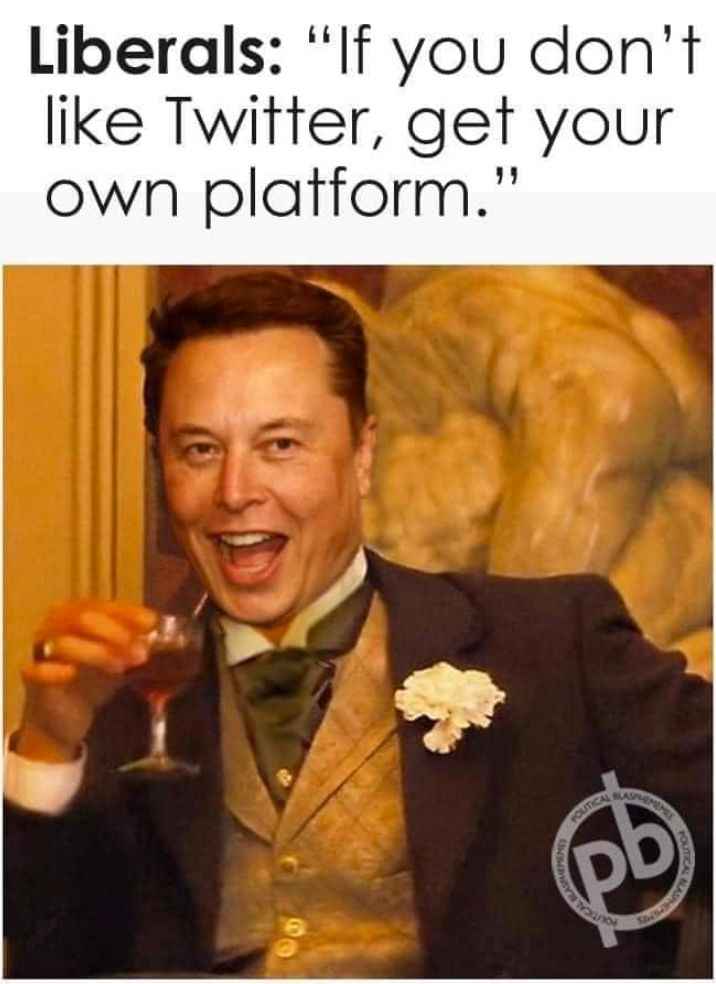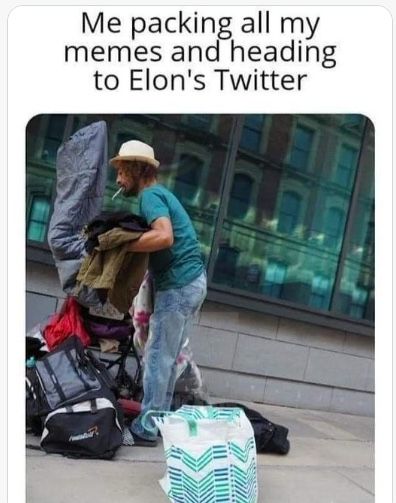Elon Musk buys a big chunk of Twitter
-
The American version was something like WaPo readers think they run the country, NYT think they should, WSJ actually run it and NY Post readers just hope they get a seat on the subway in the morning.
That joke is old, from when the Grahams ran WaPo and before Murdoch bought the journal and took it down market.
-
The American version was something like WaPo readers think they run the country, NYT think they should, WSJ actually run it and NY Post readers just hope they get a seat on the subway in the morning.
That joke is old, from when the Grahams ran WaPo and before Murdoch bought the journal and took it down market.
@jon-nyc said in Elon Musk buys a big chunk of Twitter:
The American version was something like WaPo readers think they run the country, NYT think they should, WSJ actually run it and NY Post readers just hope they get a seat on the subway in the morning.
That joke is old, from when the Grahams ran WaPo and before Murdoch bought the journal and took it down market.
It's from the comedy show Yes, Minister, which aired in the 1980's. One of the best satirical shows ever done.
-
@Klaus said in Elon Musk buys a big chunk of Twitter:
You've got to love Elon: First buying 10% and becoming a director of Twitter, then asking publicly whether Twitter is dying

Twitter higher-ups must be shitting themselves.
-
Yes I commented a few days ago in response to some tweet jon posted that the phrase “free speech” has become marginalized to tribal leftists. It’s long been clear that some of us appreciate free speech more than others, and that appreciation, or lack thereof, predicts political leaning.
-
The article in the tweet, with comments from the RWEC:
https://www.washingtonpost.com/outlook/2022/04/08/musk-twitter-equity-discrimination-speech/
As the company’s largest shareholder, Musk will no doubt have outsize influence — and his clout will be magnified by the board seat. He can bend the company toward his preferences, removing reasonable policies on hateful speech and urging people who are harassed to have thicker skins. And he has a stick that he can use to further change Twitter: The implicit threat that he will buy a controlling stake in the company, and impose his will that way. (For now, he has pledged not to own more than 14.9 percent of the company, but he could change his mind and give up his board seat.)
Musk’s appointment to Twitter’s board shows that we need regulation of social-media platforms to prevent rich people from controlling our channels of communication.
"In the first place, does Pao know who owns the Washington Post? None other than Jeff Bezos, the founder of Amazon and now a multilateral uber-billionaire competing in the private-sector space race … against Musk. Oddly enough, Pao never mentions Bezos and his ownership of the “democracy dies in darkness” Post, even though Bezos’ net worth is now estimated around $180 billion. That’s not as much as Musk’s estimated net worth of $300 billion, but in practical terms, what’s the difference? Carlos Slim isn’t quite up to that level, having a personal net worth estimated at only $70.4 billion, but his ownership of 17.4% of the New York Times’ Class A shares makes Musk’s 9.2% of Twitter look paltry in comparison.
"For that matter, Michael Bloomberg still owns a controlling interest in Bloomberg LP and its news and stock-ticker empires, but he founded the company rather than buying into it. That, clearly, has not made him any less of a “rich person” that is “controlling our channels of communication.” Did Pao raise this issue in 2020, when Bloomberg attempted to buy his way to the Democratic Party presidential nomination?
Billionaire ownership of the Washington Post, NYT, Bloomberg, and their control of reportorial functions matters a whole lot more than social-media platforms to democracy. However, if we want to focus on social media platforms and other forms of communication, who owned and controlled Twitter and Facebook before last month? Billionaires like Jack Dorsey ($7.4 billion net worth), Mark Zuckerberg ($79.4 billion), and their associates. The same is true with internet providers, Hollywood studios, cell-phone manufacturers and service companies, and on and on and on. Corporate boards are comprised of the heaviest investors and/or their allies; very few if any people of modest means sit on them.
Rich people have been controlling “our channels of communication” all along. Pao’s unhappy because the wrong “rich person” bought into the club.
-
It would be interesting to know what’s behind this.
Keep in mind the board seat came with him signing a “stand still agreement” limiting him to 14.9% of the stock. Thus no hostile takeover was possible.
Without that agreement, Twitter has that possibility hanging over its head. It could give Musk even more influence.
-
The article in the tweet, with comments from the RWEC:
https://www.washingtonpost.com/outlook/2022/04/08/musk-twitter-equity-discrimination-speech/
As the company’s largest shareholder, Musk will no doubt have outsize influence — and his clout will be magnified by the board seat. He can bend the company toward his preferences, removing reasonable policies on hateful speech and urging people who are harassed to have thicker skins. And he has a stick that he can use to further change Twitter: The implicit threat that he will buy a controlling stake in the company, and impose his will that way. (For now, he has pledged not to own more than 14.9 percent of the company, but he could change his mind and give up his board seat.)
Musk’s appointment to Twitter’s board shows that we need regulation of social-media platforms to prevent rich people from controlling our channels of communication.
"In the first place, does Pao know who owns the Washington Post? None other than Jeff Bezos, the founder of Amazon and now a multilateral uber-billionaire competing in the private-sector space race … against Musk. Oddly enough, Pao never mentions Bezos and his ownership of the “democracy dies in darkness” Post, even though Bezos’ net worth is now estimated around $180 billion. That’s not as much as Musk’s estimated net worth of $300 billion, but in practical terms, what’s the difference? Carlos Slim isn’t quite up to that level, having a personal net worth estimated at only $70.4 billion, but his ownership of 17.4% of the New York Times’ Class A shares makes Musk’s 9.2% of Twitter look paltry in comparison.
"For that matter, Michael Bloomberg still owns a controlling interest in Bloomberg LP and its news and stock-ticker empires, but he founded the company rather than buying into it. That, clearly, has not made him any less of a “rich person” that is “controlling our channels of communication.” Did Pao raise this issue in 2020, when Bloomberg attempted to buy his way to the Democratic Party presidential nomination?
Billionaire ownership of the Washington Post, NYT, Bloomberg, and their control of reportorial functions matters a whole lot more than social-media platforms to democracy. However, if we want to focus on social media platforms and other forms of communication, who owned and controlled Twitter and Facebook before last month? Billionaires like Jack Dorsey ($7.4 billion net worth), Mark Zuckerberg ($79.4 billion), and their associates. The same is true with internet providers, Hollywood studios, cell-phone manufacturers and service companies, and on and on and on. Corporate boards are comprised of the heaviest investors and/or their allies; very few if any people of modest means sit on them.
Rich people have been controlling “our channels of communication” all along. Pao’s unhappy because the wrong “rich person” bought into the club.
They don’t even have to get into whattaboutism. The piece was absurd on its face. Literally all of her points fell flat and were totally unrelated to the supposed topic of Musk’s support for free speech. Basically it was “Musk bends SEC rules and a few of his many thousands of employees have done bad things, ergo he won’t give you free speech”.
-
It would be interesting to know what’s behind this.
Keep in mind the board seat came with him signing a “stand still agreement” limiting him to 14.9% of the stock. Thus no hostile takeover was possible.
Without that agreement, Twitter has that possibility hanging over its head. It could give Musk even more influence.
-
I think it was all about the “code of conduct” that’s in the agreement. My guess is there was verbiage that would have limited Elon’s public behavior and posts.

